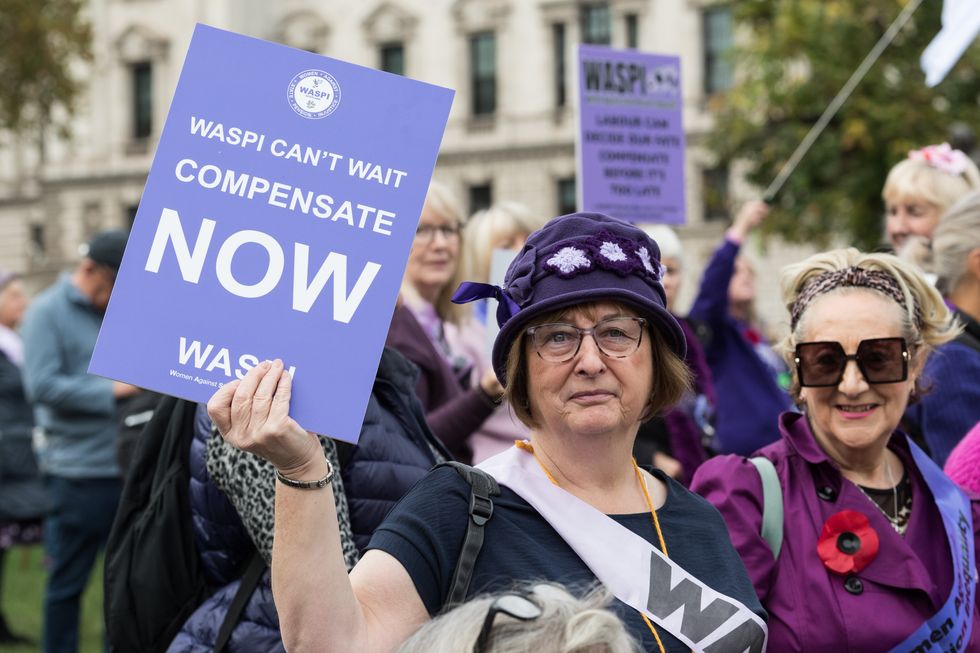Lucy Powell on WASPI women
GBNEWS
In its legal challenge, Waspi is seeking specific remedies from the High Court
Don't Miss
Most Read
Trending on GB News
The Waspi campaign has hit a major fundraising milestone as its legal fight over state pension age changes gathers pace.
In its legal challenge, Waspi has published two main grounds to claim against the government's decision not to award compensation following the Parliamentary and Health Service Ombudsman's (PHSO) findings.
The Women Against State Pension Inequality (Waspi) campaign has now increased its target to £230,000 as it seeks a cost capping order from the court.
They have outlined two key reasons for challenging the government’s decision not to offer compensation.
The first argument centres on the government's rejection of the PHSO's findings, which Waspi claims was not based on "cogent or even rational reasons".
When refusing compensation, the Department for Work and Pensions (DWP) claimed the PHSO's decision contained a "logical flaw".

A widower has asked whether he would likely be entitled to his late wife's compensation, should any be paid to Waspi women
PAThe government also argued it failed to consider that sending letters was "often not an effective way to change levels of awareness".
Waspi has challenged this reasoning as irrational, particularly regarding the government's interpretation of evidence about communication effectiveness.
Specifically, Waspi argued the government's reliance on a 2014 survey showing only a 25 per cent chance of people reading and recalling unsolicited letters was misplaced.
"It is irrational for the defendant to rely on data from the 2014 survey as any kind of reliable indication as to the effectiveness of letters sent and received from 2006," the claim report stated.

Liz Kendall is under fire for her previous support for the Waspi campaign
PA / WASPI / LIZ KENDALLThe campaign contends the government overlooked the Hooper Report and available data about letter volumes, which would have shown 2006 was "around the historic high-water mark for UK postal communications".
The second ground for Waspi's claim challenges the government's assertion that no compensation is justified because "the substantial majority of women were aware of their state pension age change".
This government position relies on the 2006 Attitudes survey, which reportedly showed 90 per cent of women aged 45-54 knew the state pension age was changing.
However, Waspi argues this interpretation is fundamentally flawed.
The campaign group contends the survey "did not provide any evidence that women who professed to know that the state pension age was changing actually understood" how it would affect their personal pension dates.
"The defendant's reliance on the 2006 Attitudes survey as a basis for rejecting the PHSO's findings and recommendation as to remedy do not bear scrutiny," Waspi stated.
The campaign argues the government's decision "does not contain the cogent (or even rational) reasons required for the defendant lawfully to reject the PHSO's report."
This distinction between awareness of changes and understanding personal impact forms a central pillar of Waspi's legal challenge.

Waspi women seek compensation from the Labour government due to DWP "maladministration"
Getty ImagesThe group maintains women were entitled to clear, direct communication about exactly when they would receive their state pensions.
The campaign has requested a declaration that the government's decision to reject compensation is "vitiated by irrationality and/or an absence of cogent reasons".
Additionally, Waspi wants the court to quash the government's decision in whole or in part. The campaign is also seeking to have its legal costs awarded.
As part of this process, Waspi explained its increased fundraising target relates to court requirements: "The rules developed by the courts on cost capping orders mean it is important that we continue to fundraise as much as we can."







